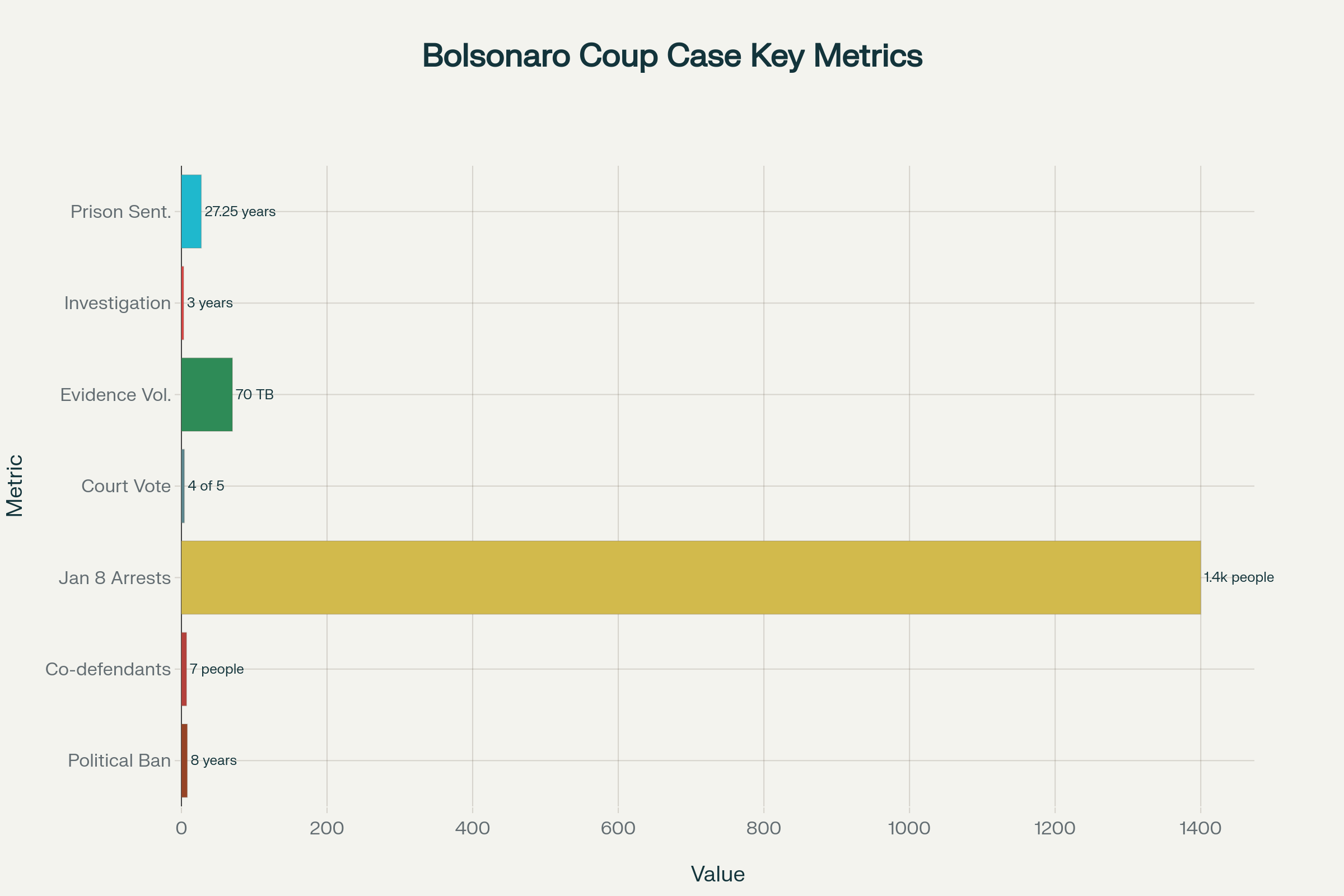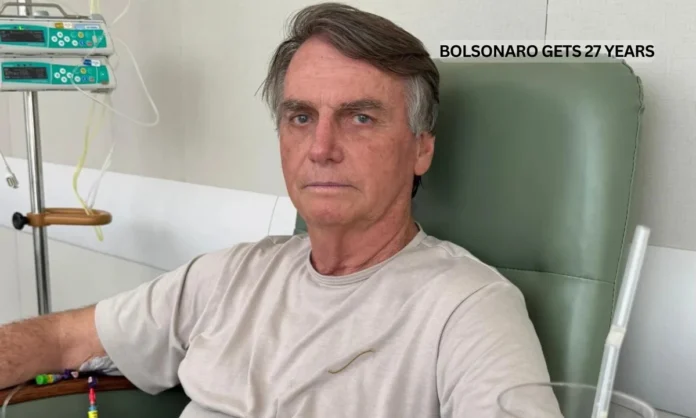Key Highlights:
- Brazil’s Supreme Court sentenced former President Jair Bolsonaro to 27 years and 3 months in prison for plotting a military coup after losing the 2022 election
- The conviction marks the first time in Brazilian history that a former president has been found guilty of attempting to overthrow democracy
- Evidence revealed an assassination plot codenamed “Operation Green and Yellow Dagger” targeting President Lula, Vice President Alckmin, and Supreme Court Justice Alexandre de Moraes
Historic Conviction Shakes Brazilian Democracy
Bolsonaro sentenced to 27 years and three months in prison marks a watershed moment for Brazilian democracy, as the country’s Supreme Court delivered its landmark verdict on September 11, 2025, against former President Jair Bolsonaro for orchestrating a coup plot to remain in power after his 2022 election defeat. The Bolsonaro sentenced ruling represents an unprecedented moment in Brazilian history, as no former president has ever been convicted of attempting to dismantle the country’s democratic institutions.
Fuck you Merrick Garland for allowing a psychopathic cult leader to return to power to destroy our country & a special fuck you to Garland's ignorant, demented supporters on this platform
— Richard Signorelli 🌱🇺🇦 🌊 🇺🇸 🇨🇦 (@richsignorelli) September 11, 2025
Bolsonaro Sentenced to 27 yrs in Prison for Plotting Coup in Brazil https://t.co/K6kFIyYqA3
Four of five Supreme Court justices voted to convict the 70-year-old former army captain on all charges, marking a decisive rejection of authoritarian attempts to subvert Brazil’s electoral system. The Bolsonaro sentenced verdict comes after extensive investigations revealed a comprehensive conspiracy involving military personnel, government officials, and a detailed assassination plot targeting key democratic leaders.
Supreme Court Evidence Reveals Extensive Criminal Organization
The Brazilian Supreme Court’s investigation uncovered overwhelming evidence that Bolsonaro sentenced proceedings were based on substantial proof of criminal conspiracy spanning multiple years. Justice Alexandre de Moraes, who presided over the case, presented evidence of a plot codenamed “Operation Green and Yellow Dagger” that included plans to assassinate President-elect Luiz Inácio Lula da Silva, Vice President Geraldo Alckmin, and Moraes himself. The assassination scheme involved detailed methods including poisoning Lula and shooting Moraes, with the operational document printed inside Brazil’s presidential palace while Bolsonaro was still in office.
Federal police investigations identified four distinct organizational groups within the criminal network, including leadership, operational management, execution units, and disinformation campaigns. The Bolsonaro sentenced case relied on 70 terabytes of evidence, including photos, videos, text messages, handwritten documents, and recorded meetings between Bolsonaro and top government officials.
| Coup Plot Evidence Categories | Details | Sources |
|---|---|---|
| Leadership Group | Bolsonaro, Defense Ministers, Intelligence Chiefs | Federal Police Report |
| Operational Management | Highway Police, Security Secretaries, Presidential Advisors | Attorney General Investigation |
| Execution Units | Military Officers, Special Forces Personnel | Supreme Court Evidence |
| Disinformation Campaign | Digital Militia, Fake News Networks | Court Documents |
January 8 Attacks and Military Intervention Plans
The Bolsonaro sentenced conviction directly linked the former president to the January 8, 2023 attacks on Brazil’s government buildings, when thousands of his supporters stormed the presidential palace, Congress, and Supreme Court. Evidence presented during the trial showed that Bolsonaro had been laying groundwork for the coup attempt since mid-2021, systematically undermining confidence in Brazil’s electronic voting system and spreading election fraud claims. On December 7, 2022, Bolsonaro held a crucial meeting at the Alvorada Palace with Defense Minister Paulo Sérgio Nogueira and military commanders, presenting a draft decree for declaring a State of Defense and creating an “Electoral Regularity Commission”.
While Navy Commander Admiral Almir Garnier pledged his forces to support the coup, Army Commander General Freire Gomes and Air Force Commander Lieutenant-Brigadier Batista Jr. refused to participate, with Freire Gomes reportedly threatening to arrest Bolsonaro if the plan proceeded. The Bolsonaro sentenced ruling emphasized that over 1,400 people were subsequently charged for their roles in the January 8 riots that caused extensive property damage and destroyed historical artifacts.
International Implications and Trump Administration Response
The Bolsonaro sentenced verdict has created significant diplomatic tensions between Brazil and the United States, particularly given the strong support former President Donald Trump has shown for his Brazilian counterpart. Trump imposed 50 percent tariffs on Brazilian imports in August 2025 as a direct response to Bolsonaro’s legal troubles, describing the trial as a “witch hunt” and expressing surprise at the guilty verdict. The Trump administration has also imposed sanctions on Justice Alexandre de Moraes and stripped him of his U.S. visa, viewing Brazil’s judicial proceedings as politically motivated persecution.
Bolsonaro’s son Eduardo, who moved to the United States in February 2025, successfully lobbied the Trump administration to take these punitive measures against Brazilian officials. The Bolsonaro sentenced case has drawn international attention as part of a broader pattern of legal accountability for far-right populist leaders, joining convictions of figures like France’s Marine Le Pen and the Philippines’ Rodrigo Duterte. The verdict represents a test case for democratic institutions confronting authoritarian challenges in Latin America’s largest economy.
Legal Consequences and Political Future
The Bolsonaro sentenced ruling carries severe long-term consequences beyond the 27-year prison term, effectively ending any prospects for the former president’s political comeback. Bolsonaro was already barred from holding public office until 2030 due to previous convictions for spreading election misinformation, but this criminal conviction extends that prohibition until 2033. The five charges on which Bolsonaro sentenced include participating in an armed criminal organization, attempting to violently abolish democracy, organizing a coup d’état, and damaging government property and protected cultural assets. Seven co-defendants, including former generals Walter Braga Netto and Augusto Heleno, former Justice Minister Anderson Torres, and top aide Mauro Cid, were also convicted on related charges.

Currently under house arrest since August 2025, Bolsonaro’s defense team has announced plans to appeal both the conviction and sentence, with his lawyer Celso Villardi arguing the penalties are disproportionate. The Bolsonaro sentenced case can only be overturned if at least two justices dissent in any appeal, but only Justice Luiz Fux voted to acquit, citing jurisdictional concerns.
Closing Assessment: Democracy’s Resilience Tested
The Bolsonaro sentenced verdict represents a watershed moment for Brazilian democracy, demonstrating that even former presidents cannot escape accountability for attacks on democratic institutions. This historic conviction sends a powerful message throughout Latin America that attempts to subvert electoral outcomes through violence and conspiracy will face severe legal consequences. The comprehensive evidence presented during the trial, spanning from systematic disinformation campaigns to detailed assassination plots, revealed the extent to which democratic norms were threatened during Brazil’s political crisis.
While Bolsonaro sentenced appeals may continue for years, the Supreme Court’s decisive 4-1 vote establishes a clear precedent that authoritarian power grabs will be met with judicial resolve. The international ramifications, particularly the diplomatic tensions with the Trump administration, highlight how domestic legal accountability can create broader geopolitical consequences in an interconnected world. As Brazil moves forward from this constitutional crisis, the Bolsonaro sentenced ruling stands as both a vindication of democratic institutions and a warning to future leaders who might consider similar antidemocratic schemes.


